- Home
- Gore Vidal
I Told You So Page 3
I Told You So Read online
Page 3
Q.If we’re talking about movies, I have to ask about Fellini’s. You have a wonderful chapter about Fellini in the book. You appear in Fellini’s Roma, one of his greatest films. Do you think Fellini was subject to the same limitations?
A.He wasn’t without limits, but he was essentially a painter. He did not like direct sound, so he never used it, as far as I know. He hated scripts, as far as I know he never really used one. The studio gave him one, and he would take it and pretend to make it. Direct sound and in English is how he got his money, and that’s the thing he never did. I used to argue with him about it all the time. He would tell me, “It’s very difficult to get money now.” I would say, “Well, your pictures don’t make any money.” He would say, “It’s not possible, look at the awards I got,” this award and that award. I said, “They like to give you awards, but they’re not going to give you money because they’ll lose it. They’re strange people, aren’t they.”
He was a wildly funny guy. At his best he was one of the greatest liars of all time. I noticed a Mr. Schickel in the room, who may have interviewed him.12 And others here may have interviewed him. The one word he hated, if you wanted him to go up the wall on you, would be “why.” There is no answer to “why?” And if there was, he was not going to tell you.
Q.We’ve lasted a half hour without mentioning George Bush, which I think is quite an achievement. But we need to mention George Bush. The Washington Post had a symposium where they rounded up a bunch of historians and asked them who was the worst President. It usually comes down to a contest between Nixon and Bush, although there was one essay that was titled “He’s Only the Fifth Worst”—you know the argument: Nixon did some good things and Bush did nothing good.13 I’m wondering if you would be interested in joining the “who is the worst President” debate.
A.I’d probably start, if you really want to be serious, with Woodrow Wilson. Imagine taking us to a war in Europe for nothing. We had no interests there, got no advantages out of it, and tens of thousands of Americans were killed. We got Prohibition out of it, and that was about it. And guess what his slogan was: “to make the world safe for democracy.” It’s like making the world safe for good temper. It’s as idiotic as that.
He had spent two seasons in the Lake District of England and had become an Anglophile. If he’d just gone back there to once again read Wordsworth and left the troops at home. Instead he redesigns Europe. He never took geography in kindergarten, he didn’t know where anything was. He broke up the only stable thing in Central Europe, the Austria-Hungarian empire. In order to create Yugoslavia?
Sigmund Freud was in such a rage. We like to think of him as a great genius of serene and august temperament. But Freud was so furious he did the most unprofessional thing ever done by any psychiatrist, much less a founder. He wrote a psychoanalysis of Woodrow Wilson without ever having met him. And he got all the details, mostly slanderous, from Bill Bullitt, a fifth-rate ambassador that President Roosevelt was sending around Europe. Oh, you should read it, it’s just fantasy gone mad. The great doctor was crazy with anger, he saw that the only stability in Europe, particularly the Europe of the Jews, was the Austro-Hungarian empire and its capital, Vienna. From there to Prague, that was a safety zone for Jews. At the end it was in shambles. So I think we must give Wilson a private place for number one.
Q.The big puzzle to me about George W. Bush is that his father represents a more traditional kind of American ruling entity, which indeed was wiser about what could be accomplished, and what couldn’t, in a place like Iraq. George Bush 41 comes from the milieu of your family, and had a more reasonable view of the world than his son, it seems.
A.I would not want to have to be immodest and check the IQ of any Bush against that of any Gore. [laughter] I do not mean to boast, but I think we’re well ahead in that desperate race. No, George Bush Sr. was just about as dumb as the son, but he took the education of a gentleman seriously, and as much as he could, behaved like one. Remember, he enlisted in the army, he was a pilot, a hero in the war—except for the two flight members who had to bail out. We never heard their story. I believe Kitty Kelley is working on it now.14 Soon we’ll know his last words to them were “bye-bye.” [laughter] That’s what they said about him at Andover, you know, when it was all over.
Q.I know we have many people here who would like to ask questions.
From the audience:
Q.You’ve written many books, and they’ve been reviewed many times, including in the New York Times. What reviews that you have received seem to you now to be the most interesting, or even the most helpful in causing you to rethink your work?
A.I’m more apt to rethink the New York Times than I am to rethink my work. I’d say the piece I most liked, and admittedly it was admiring, was Harold Bloom on Lincoln and on my approach to American history. There is a wonderful German word that I’ve tried to make popular, when I can remember it: “Einfuehlen.” That is the ability to work your way into the past, never forgetting you’re in a foreign country. It isn’t the present with new decorations, it’s another place. It’s another world. If you can keep that sense of strangeness as you work, then you’ve got half the job done. But I find most American writers lack Einfuehlen. They’re not very good at being naturalistic writers either, which means that they have a hard time with their own surroundings. Due to the, you know, rigors of getting tenure at Ann Arbor, which I’ve already referred to. As for the negative stuff about me: consider the source.
Audience Q.Your observation about the changes in the meaning of the word narcissism: I wonder if you’d talk about that.
A.As it’s used now, narcissist means a fag. I tried to give it a deeper meaning. I was helping out some book reviewer. I said “a narcissist is anyone better looking than you are.” [laughter] I think that struck a nerve, because I’ve had people come up to me on the street, keening, howling, over that. Still suffering over that blow.
Follow-up Q.You go on to make the point about how the word is now sometimes associated with liberals.
A.Yes, narcissistic liberals. Because they want to help others, and not themselves. The height of narcissism. But then altruism has never had a big market for the freedom clan. I thought you were going to quote me on altruism. I thought that wasn’t too bad. I said, “Altruism is a bit like acne, it hits many people in different ways. It hits the young, often in adolescence, but luckily usually leaves no scars.”
Audience Q.I read a recent piece about your book, in which you were quoted as saying the only times you’ve been completely happy have been at the movies. Watching movies. I am wondering if you could explain the origins of that happiness.
A.Oh, it was generational. I was born at the time when the talkies first came in, and I was fourteen years old in the greatest year of the talking picture, 1939. I saw them all, and it was bliss to have been fourteen then, seeing the Wizard of Oz. That was all I meant by that. I did not mean I get that feeling going to see Monsieur Mel Gibson, the famous French auteur. No, I don’t feel it in later cases.
Audience Q.I was curious about how easily the American electorate is manipulated in all kinds of ways. As somebody who is a member of a democracy of some sort, some crude sort, how do you deal with that? Jefferson thought we really shouldn’t be an electoral democracy, you know, a one man-one vote kind of thing. How do you look upon the future of this country with any optimism, when how blatantly manipulated a great deal of the electorate is—like people who vote against their economic interests in Ohio, etc, etc.
A.Well the only optimists are the gas and oil people, and they have every reason to be. It has always been the trick of our republic to get people to vote wholeheartedly against their interests. That’s very exciting when you can do it. [laughter] I remember when I was running for Congress upstate New York, in Duchess Country, and there would be these farmers going around in old, old, Model-T Fords and so on, with stickers—Vote for Rockefeller. Sometimes I would stop them, and we’d chat. I’d say, “Why do you like
him?” because he was pretty poisonous even then. They said, “He’s so rich he wouldn’t steal our money.”
I said, “That wouldn’t stop him. Rich people go right on robbing people you know.” He was spending a lot of money up in Albany. He has his grand pyramid, he has his sphinx, all types of things up there to remind people of the Rockefellers.15 And I couldn’t get a straight answer out of them.
I asked, “Do you think you’ll get a check out of him someday? Or, like his grandfather, he’ll give you a dime?”A lot of people out there could be bought for a dime. I remember when I was running for the House, Republicans since time immemorial had bought votes in the district. And the price had gone up in 1960 to about $15, which is a hell of a lot of money up there. And particularly in nearby Tivoli, which I lived not too far from.
My campaign manager was Judge Hawkins, a wonderful guy. He was head of the Democratic Party up there. He said, “They’re going to beat us because of the bought votes.”
And I, a perfect Populist, said, “Why don’t we buy them too? Just pay a few dollars more?” I understand the workings of the market. That’s how it works. That’s why I proposed myself for office in the great republic, for deals in business. He said, “They always catch us, they never catch them.” And that man was a judge.
Audience Q.I read Myra Breckinridge a long time ago, I remember it absolutely wowed me because it seemed so sexually perverse, but absolutely brilliant. It’s been forty years since you wrote Myra, yet America seems to have become more puritanical. Do you have any sort of insights on where America might be heading on accepting more sexual pluralism?
A.I think what you have now is a combination of advertising, which is essentially erotic. And we had a drug generation for a time, which perhaps encouraged sexual activity. I don’t know what the changes have been, but forget all about values. I don’t see the freedoms that we enjoyed back in the ’60’s, they have not been translated into political action, nor have they had much of any effect, that I can tell.
But we are a funny country: we’ve always had more good writers than good readers. So here we are, a bunch of writers just sort of marooned in limbo with nobody to read the things. Just passing asteroids. With other countries, if you have writers, you have readers. We have writers, we can’t get anyone to read them. The theory of American publishing today is “print and pulp, print and pulp, print and pulp,” as quickly as possible, to have room for another to “print and pulp.”
The intermediary time, which might have been used for marketing—I know I sound like a merchant, but we’ve got to sell something—should have been used to get people to read. Also look at what the schools do. Those who even take up literature at all, they removed Shakespeare—it’s too difficult for the curriculum. It used to be you had to read Julius Caesar at least, because there was no sex in it. It’s not my reading of what happened with Cassius and Brutus, which could have been a very hot scene, but anyway—in the eye of the beholder is the beholden.
Audience Q.Is God a Republican? I mean, if you were writing that book, would it be in the sci-fi section? The comic section? Who could write about what is going on now? And would anyone believe it?
A.I think I could have thought it up. It’s not difficult, you know. I mean, it’s so easy to propagandize. 70 per cent believed, and still believe, that Saddam Hussein was working hand in glove with Osama bin Laden. They hated each other, and that is known everywhere but in the land of the free, where nothing is known. And nothing is known because the media is so poisonous and so controlled.
And they say, “The people are dumb.” No, they’re not dumb, they are ignorant. They have no access to information. Or they get so much access they don’t know what to believe and end up believing nothing. I think, as a writer fifteen years ago, I would have been more interested in that subject—how you turn people off the whole idea of learning anything at all through reading.
I remember when Burr first published. I had a great friend in the business, very bright woman. I introduced her to Edith Wharton and she never looked back, so she is a good reader when she wants to be. She said, “Oh, I got your book,” and I said, “But you’re not going to read it.” She said, “How did you know?”
I said, “Why not?” And she said, “Well, I don’t know who Aaron Burr is.” I replied, “That’s the idea! If you already knew, why would I have written a book?” This was beyond her.
Everyone here has written journalism. You’re up against it all the time: no one knows who that person is—so why write a book about them? Why write a piece about them? Nobody knows them. But that’s the reason for writing, isn’t it. Difficult thought, difficult thought. Only write about what you already know. So we’ve got Elizabeth Taylor until the end of time.
Audience Q.If you could look back over the course of a life, what do you think have been the major factors that contributed to the rise in political apathy?
A.Apathy is just lack of energy, which to me, is just the literal definition of decadence. So the energy gives out in a society—that is decadence. We gave out some time ago. If it were just in the culture—literature and so on, music—ok, ok, we can play other games. But it’s gone out of everything. It was outsourced. And apathy came in from India, and we’ve got apathy in every street corner. Our old get-up-and-go-ness has gone to Bangladesh.
Follow-up Q.But why?
A.Society’s changed. Capitalism, if we want to get down to it, as Marx put it. You can make widgets cheaper in poor countries, so we go to poor countries to make them, depriving our own people of livelihood. If we had labor unions we might be able to change that, but we’ve done away with them because they stood in the way of Republican majorities. So, there is work to be done politically.
Q.Our time is almost up, I’m going to ask the last question. At this point in your life you’ve done it all. You’ve written almost two dozen books, you’ve won all the prizes, you’ve done the movies, the plays. What keeps you going?
A.All my life I’ve been over-excited by stupidity. Just before I came here I was listening to the leader of the free world eulogizing the great man of the Iraq war as the greatest Secretary of Defense in history. We used to call him the Secretary of War, before the dumb-dumbs took over, and then after 1948 it became Defense, once we decided we were going to be at war all the time. Too much overlap. All I have to do is turn on CNN now, and I have to say, I’m rolling on the floor.
3The 2000 Shadow Convention: Radio Interview
Plaza Hotel, New York City
September 9, 2000
Vidal was in New York City in September, 2000, for the revival of his play The Best Man, which that year starred Charles Durning, Spalding Gray, and Chris Noth. The interview ostensibly was for KPFK radio in Los Angeles, where I had a show, but we talked much too long for that, an hour and twenty minutes, and the station ended up broadcasting only excerpts. He invited me to do the interview in his suite at the Plaza Hotel, where he and his partner Howard Austen were staying. When I arrived, he was wearing the hotel white terrycloth robe, and I had some difficulty finding a place attach the microphone for our new Digital Audio Recorder.
It was a big season for Gore: not only was his play being revived on Broadway, but the final novel of his “Empire” series, The Golden Age, had just been published. And of course we were in the middle of the Bush v. Gore political campaign, and many on the left were supporting Ralph Nader, arguing that there was little difference between Gore and Bush.
Q.The last time I saw you in Los Angeles, a month ago [August 2000], you were standing on the back of a flatbed truck downtown on Figueroa Avenue, as the Democratic Convention was reaching its climax three blocks away. You had been scheduled as a speaker at the Shadow Convention, a left-wing alternative to the DNC, but the police had ordered an evacuation of the building where you were to speak. Hundreds of people had gathered in the street around this flatbed truck; the LAPD’s finest had lined up, in riot gear, batons at the ready, at both ends of the block; and you were
addressing the assembled crowd. What was that like for you?
A.After all, I lived through the wars in Chicago in 1968, when the police rioted, and I saw disturbing similarities between 1968 and 2000. However, the Los Angeles Police Department was pretty clever. As you know, they have their own foreign policy, and their own C.I.A., and no doubt a unit to remove from the sphere with extreme prejudice certain individuals. Obviously they had decided that Ms. Huffington’s Shadow Convention should not take place.
The Shadow Convention was for speakers whose views did not go along with the establishment of the county and were going to say things opposite to what was being said at the Democratic Convention. We were going to talk about, among other things, legalizing drugs. A lot of them were for Nader, and it might have been quite interesting. I arrived there, Christopher Hitchens was there. We sat and we talked, and we waited and we waited. I wondered why we were waiting. There were 600 people in the hall, people who had come to take part in the Shadow Convention. We waited and waited, and nobody seemed to know what was happening, except that we knew nothing was happening.
Then Ms. Huffington came in to tell us that there had been a bomb report—that a bomb had been set in the building and we could not go on. So we sat and discussed that. And this seemed a very unlikely thing, but you never know. We live in a very dangerous world. Then the word came that we were to evacuate the building—this was presumably great-heartedness on the part of the police, to save these vile people who did not celebrate the American way of life as does the LAPD.

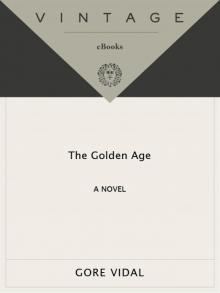 The Golden Age: A Novel
The Golden Age: A Novel Death Before Bedtime
Death Before Bedtime Burr
Burr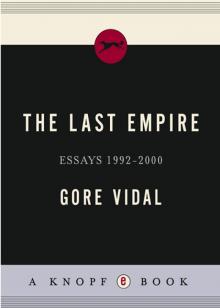 The Last Empire
The Last Empire Empire: A Novel
Empire: A Novel The Selected Essays of Gore Vidal
The Selected Essays of Gore Vidal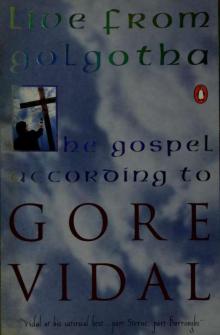 Live From Golgotha
Live From Golgotha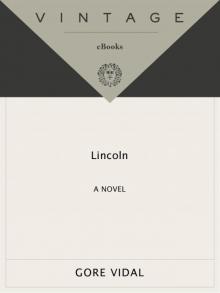 Lincoln
Lincoln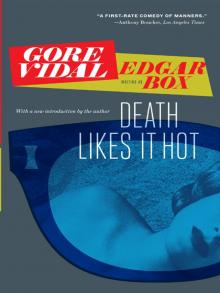 Death Likes It Hot
Death Likes It Hot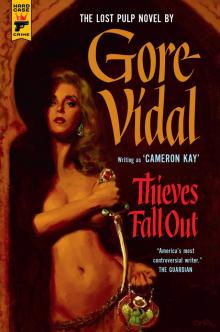 Thieves Fall Out (Hard Case Crime)
Thieves Fall Out (Hard Case Crime)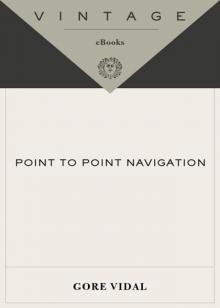 Point to Point Navigation
Point to Point Navigation Williwaw
Williwaw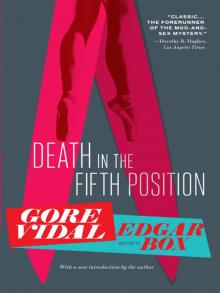 Death in the Fifth Position
Death in the Fifth Position In a Yellow Wood
In a Yellow Wood Julian
Julian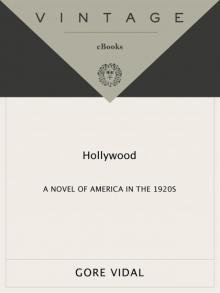 Hollywood
Hollywood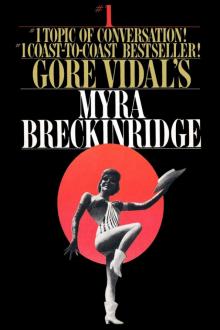 Myra Breckinridge
Myra Breckinridge Messiah
Messiah The Second American Revolution and Other Essays 1976--1982
The Second American Revolution and Other Essays 1976--1982 Homage to Daniel Shays
Homage to Daniel Shays Empire
Empire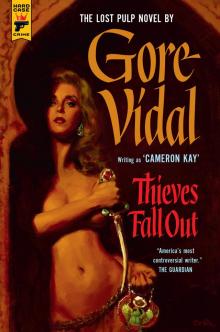 Thieves Fall Out
Thieves Fall Out 1876
1876 The City and the Pillar
The City and the Pillar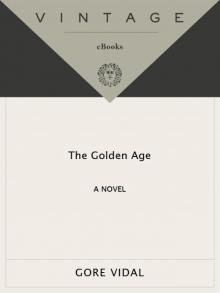 The Golden Age
The Golden Age At Home
At Home